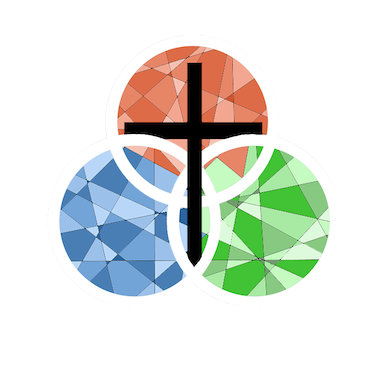Pastor Tim had a bit of fun in his recent sermon ribbing me as a potential source for boring distinctions in the theology of the Trinity.
I smiled when I heard it, because there are few topics more difficult than explaining the Christian understanding of the Trinity. A friend of mine and ministerial intern at UniLu in Cambridge, once remarked in her sermon on Trinity Sunday that teaching about the Trinity was like eating a bony fish: best done very, very carefully!
Pastor Tim handled this choke hazard well!
I also took Pastor Tim's teasing as a challenge: how might I bore you with an academic point or two?
I am a historian of Christianity, not a theologian, so I’m not going to "explain" the theologies of the Trinity. (As if I could!) But I’m going to offer a historical observation.
Yes, I said theologies of the Trinity—plural—because there have been many different attempts to make sense of the Christian teachings about the Trinity, both before and after the framing of the formal Trinitarian doctrine established in the Ancient Creeds, especially the Nicene Creed that was settled upon over the course of the fourth century.
Why so many theologies over the centuries? Christian theology is human systematic reflection or commentary on,
- the experiences of God retold in what Christians call the Old Testament;
- experiences of the man Jesus retold in what Christians call the New Testament;
- experiences of the Christian communities over the centuries.
And here is where the words “human” and "systematic" are important. What might human beings turn to to interpret systematically the experiences of God recounted in Scriptures, Sacraments, and experiences of the Church in the world?
An answer: theologians have generally used the most approved wisdom (philosophy) and science of their times. And, important to historians, that approved philosophy or science has changed!
In the centuries around the framing of the Nicene Creed, that wisdom or science was what we historians name, using shorthand, as "middle Platonic" philosophy; it tended to be hierarchical and tended to favor unchanging essences and dualities. In the so-called "Middle Ages" that wisdom or science was more Aristotelian; hence more lawlike and a bit more dynamic. And in the last century or so, some theologians have been more comfortable adapting modern scientific notions of change, psychological insights regarding inner relationships, and modern philosophies such as existentialism.
To sum up: theologies are attempts to make sense of experience, using the best science or wisdom of the time. Theologies are secondary to the experiences themselves: the experiences of God's self-disclosure in Scripture, God's self- disclosure in the Sacraments and ceremonies of worship, and God's self-disclosure in our lives, our experience of others, and our experience of the world.The reality to which these commentaries attest has not changed, or at least Christians generally confess that they have not. But the human attempt to explain that reality has demonstrably changed over time.
When we Lutherans confess the Trinity in, say, the Nicene Creed, we are pledging solidarity with Christians who came before us, Christians who live around us, and Christians who shall come after us. A solidarity rooted not in a shared understanding of words but in a shared experience of an ultimately mysterious encounter with the divine in Scripture, in Sacraments and Worship, and in life and service in the world. We distinguish these experiences using the names like "Father," "Son", "Holy Spirit" or "Creator," "Redeemer," "Advocate" for different ways in which we encounter what we confess is one God. And some of us go further and insist that these differences go beyond encounters and disclose something "real" about God's own nature.
Ultimately, we are only human beings trying to explain to ourselves our encounter with a grand mystery. We hope that we've got it at least a bit right; we trust, however, that the relationship depends not on whether we've "got it right" but on the fact that God has created and sustains this relationship. Our faith relies ultimately not on our intelligence and wisdom but on God our creator’s love for us disclosed in Christ and attested to by the Holy Spirit.
—— (An aside: Autocorrect initially changed Nicene to niceness in the paragraph on the Creeds—niceness creed—a particularly inappropriate "correction" given how much strife and even bloodshed that has been occasioned in the church over the meaning and extent of the Nicene Creed and the "right" understanding of the Trinity! A topic for a boring talk some other day!) 3
